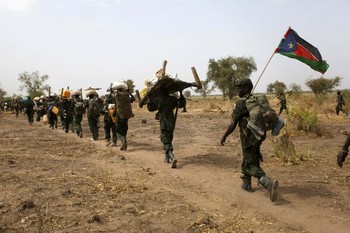Progress reported in talks between Khartoum & Juba over rebel support
August 22, 2013 (KHARTOUM) – Delegations from north and south Sudan concluded two-day security meetings in Khartoum which focused mainly on handling claims of supporting rebels who fighting central governments in both nations.

The two sides agreed that their respective armies would handle all the logistical aspects for joint field teams to be stationed on agreed border points. Setting up more border points is to be done after consultation between military intelligence chiefs and military attaches.
This process shall commence within a week, the statement said.
They also agreed to bolster communication between intelligence and security heads in the two countries for serious exchange of ideas and resolution of any disputes.
Armies of both countries will also withdraw and re-deploy in accordance with the map provided by the African Union High-Level Implementation Panel (AUHIP).
The Sudanese side was led by head of military intelligence Lieutenant General Sideeg Amer Hassan ad his South Sudanese counterpart Major General Mag Paul.
Al-Muiz Farouk who is the Secretary General of Sudan’s delegation said the meeting represents a strong boost to security arrangements particularly on rebel support and creation of joint field teams on the borders.
The next meeting will take place on September 17 in South Sudan capital of Juba.
Khartoum, aggravated by the growing intensity and scope of rebel attacks, announced last June that it will no longer allow South Sudan to export its oil through Sudanese pipelines. The order was to take effect within 60 days.
But after appeals from AU and China, Sudanese president Omer Hassan al-Bashir agreed to extend the deadline till next month.
Sudan accuses Juba of backing the rebel coalition known as Sudanese Revolutionary Front (SRF) which operates mainly in the border states of Blue Nile and South Kordofan.
Juba in turns accuses Khartoum of lending support to rebels in Jonglei state.
The Sudanese government insists that addressing security issues should be the prerequisite for implementing other cooperation accords signed last year.
(ST)
